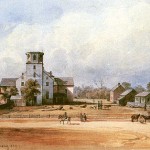Connoisseurs of Indiana’s wild delicacies are known to traipse through forests in early spring foraging morel mushrooms, and along rivers and streams collecting paw-paws in the fall. Around the time of the first frost, others might retreat to their favorite persimmon grove. Although not cultivated as widely as its Asian counterpart, the native persimmon— or Diospyros virginiana — is treasured by Hoosiers along with those devoted to the preservation of native and heirloom plants and regional cuisine nationwide. The small burnt-orange fruit — whose Latin name means “food for the gods” — grows on medium sized trees that belong to the ebony family. A high tannin content makes persimmons virtually inedible until they are soft enough to drop to the ground, in late autumn. Though persimmons are indigenous throughout the southeastern U.S., the trees are known to thrive best in the Mississippi Basin and especially the Wabash valley. According to local records, trees there have been measured at over 100 feet tall and two feet in diameter.
Persimmons were an important part of the native American diet, since they are rich in phosphorous, potassium and Vitamin C. The fruit was eaten ripe and preserved for winter use. The word “persimmon,” in fact, derives from the Algonquin word for “dried fruit.” Persimmons figure prominently in Indian legends, and the fruits were baked into loaves Cherokees offered early European settlers. An historian of regional cuisine writes that “in 19th Century Brown County… fallen persimmons were a godsend at harvest time” and that “around places like Gnaw Bone you can [still] find people making persimmon fudge and persimmon pudding.” The James Whitcomb Riley Cookbook includes a recipe for “Indiana Persimmon Almond Pudding Cake.” Southern Indiana still represents a hub of persimmon activity and advocacy in the U.S. Home to substantial persimmon orchards and a significant distributor of persimmon pulp, the area also boasts a unique harvest ritual–the Persimmon Festival, held every year since 1947 in Mitchell, Indiana.
For more information:






















